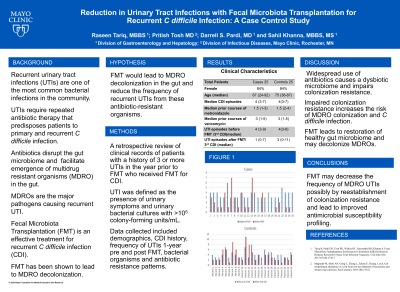Back


Poster Session B - Monday Morning
Category: Colon
B0088 - Reduction in Urinary Tract Infections in Patients Treated With Fecal Microbiota Transplantation for Recurrent C. difficileInfection: A Case Control Study
Monday, October 24, 2022
10:00 AM – 12:00 PM ET
Location: Crown Ballroom

Has Audio

Raseen Tariq, MD
Mayo Clinic
Rochester, MN
Presenting Author(s)
Raseen Tariq, MD, Pritish Tosh, MD, Darrell S. Pardi, MD, MS, FACG, Sahil Khanna, MBBS, MS, FACG
Mayo Clinic, Rochester, MN
Introduction: Antibiotics used for recurrent urinary tract infections (UTIs) predispose patients to develop recurrent C. difficile infection (rCDI) by disruption of the gut microbiome. Also, antibiotics facilitate emergence of multidrug resistant organisms (MDRO) in the gut, serving as reservoir for pathogens that cause UTIs. We hypothesize that fecal microbiota transplantation (FMT) for rCDI could decolonize the gut and alleviate UTIs.
Methods: Patients with 3 or more UTIs the year prior to FMT for CDI were cases and controls were patients with 3 or more rCDI episodes and 3 or more UTIs the year prior managed with antibiotics (vancomycin or fidaxomicin). Patients with urinary symptoms and culture samples with a single bacterial colony count >105 colony-forming units/mL were considered positive.. For positive samples, data were collected regarding the organism cultured and antimicrobial resistance patterns.
Results: A total of 25 cases and controls were included and had similar age and gender (67 years (range 24-92) vs 75 (range 38-87) and 84% female in both). The median number of CDI episodes for cases was 3 (range 3-6) and for controls was 3 (range 3-7).
For cases, there was a statistically significant decrease in the frequency of UTIs from a median of 4 (range 3-9) episodes in the year before FMT to median of 1 (range 0-7) (p< 0.001, Wilcoxon sign rank test). Amongst controls, no difference was noted with median UTIs: 4 (range 3-8) in the year prior to 3rd CDI and 3 (0-11) in the subsequent year (p=0.27, Wilcoxon sign rank test).
Amongst cases, 107 positive urine samples were identified in the year before FMT and 45 positive samples in the year after FMT. Escherichia coli was the most common organism cultured from pre and post FMT urine samples followed by Klebsiella sp. There was a numerical decrease in the antimicrobial resistance and MDRO E coli frequency (pre FMT 40% vs post FMT 22.2%, p= 0.18). For Klebsiella, there was a decrease in antimicrobial resistance and MDRO frequency (35.4% vs 15.3%, p=0.18)
Amongst controls, 105 positive urine samples were identified in the year before FMT and 95 positive samples in the year after FMT. There was no difference in the proportion of MDRO E. coli (49.1% vs 57.1%. p=0.46) or Klebsiella (42.8% vs 39.2%, p=0.82) in the year before and after 3rd CDI.
Discussion: FMT decreases the frequency of UTIs and the proportion of MDROs, likely by decolonizing the gut. FMT might be considered as a potential treatment in high-risk patients with recurrent UTIs
Disclosures:
Raseen Tariq, MD, Pritish Tosh, MD, Darrell S. Pardi, MD, MS, FACG, Sahil Khanna, MBBS, MS, FACG. B0088 - Reduction in Urinary Tract Infections in Patients Treated With Fecal Microbiota Transplantation for Recurrent C. difficileInfection: A Case Control Study, ACG 2022 Annual Scientific Meeting Abstracts. Charlotte, NC: American College of Gastroenterology.
Mayo Clinic, Rochester, MN
Introduction: Antibiotics used for recurrent urinary tract infections (UTIs) predispose patients to develop recurrent C. difficile infection (rCDI) by disruption of the gut microbiome. Also, antibiotics facilitate emergence of multidrug resistant organisms (MDRO) in the gut, serving as reservoir for pathogens that cause UTIs. We hypothesize that fecal microbiota transplantation (FMT) for rCDI could decolonize the gut and alleviate UTIs.
Methods: Patients with 3 or more UTIs the year prior to FMT for CDI were cases and controls were patients with 3 or more rCDI episodes and 3 or more UTIs the year prior managed with antibiotics (vancomycin or fidaxomicin). Patients with urinary symptoms and culture samples with a single bacterial colony count >105 colony-forming units/mL were considered positive.. For positive samples, data were collected regarding the organism cultured and antimicrobial resistance patterns.
Results: A total of 25 cases and controls were included and had similar age and gender (67 years (range 24-92) vs 75 (range 38-87) and 84% female in both). The median number of CDI episodes for cases was 3 (range 3-6) and for controls was 3 (range 3-7).
For cases, there was a statistically significant decrease in the frequency of UTIs from a median of 4 (range 3-9) episodes in the year before FMT to median of 1 (range 0-7) (p< 0.001, Wilcoxon sign rank test). Amongst controls, no difference was noted with median UTIs: 4 (range 3-8) in the year prior to 3rd CDI and 3 (0-11) in the subsequent year (p=0.27, Wilcoxon sign rank test).
Amongst cases, 107 positive urine samples were identified in the year before FMT and 45 positive samples in the year after FMT. Escherichia coli was the most common organism cultured from pre and post FMT urine samples followed by Klebsiella sp. There was a numerical decrease in the antimicrobial resistance and MDRO E coli frequency (pre FMT 40% vs post FMT 22.2%, p= 0.18). For Klebsiella, there was a decrease in antimicrobial resistance and MDRO frequency (35.4% vs 15.3%, p=0.18)
Amongst controls, 105 positive urine samples were identified in the year before FMT and 95 positive samples in the year after FMT. There was no difference in the proportion of MDRO E. coli (49.1% vs 57.1%. p=0.46) or Klebsiella (42.8% vs 39.2%, p=0.82) in the year before and after 3rd CDI.
Discussion: FMT decreases the frequency of UTIs and the proportion of MDROs, likely by decolonizing the gut. FMT might be considered as a potential treatment in high-risk patients with recurrent UTIs
Disclosures:
Raseen Tariq indicated no relevant financial relationships.
Pritish Tosh indicated no relevant financial relationships.
Darrell Pardi: Abbvie – Consultant. Boehringer Ingelheim – Consultant. Ferring – Consultant. Finch – Grant/Research Support. Immunic – Consultant. Merck – Consultant. Otsuka – Consultant. Rebiotix – Grant/Research Support. Seres – Grant/Research Support. Takeda – Grant/Research Support. Vedanta – Consultant.
Sahil Khanna: Ferring Pharmaceuticals – Grant/Research Support. Finch – Grant/Research Support. Niche – Consultant. Pfizer – Grant/Research Support. Probiotech – Consultant. Seres Therapeutics – Grant/Research Support. Takeda/Shire – Consultant. Vedanta – Grant/Research Support.
Raseen Tariq, MD, Pritish Tosh, MD, Darrell S. Pardi, MD, MS, FACG, Sahil Khanna, MBBS, MS, FACG. B0088 - Reduction in Urinary Tract Infections in Patients Treated With Fecal Microbiota Transplantation for Recurrent C. difficileInfection: A Case Control Study, ACG 2022 Annual Scientific Meeting Abstracts. Charlotte, NC: American College of Gastroenterology.
